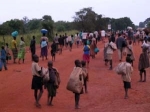Silent Voices:
The Ugandan army has moved hundreds of thousands of civilians against their will into “protected villages” that offer little security and hardly any assistance, and has victimized ordinary people with brutal raids against suspected LRA militants.
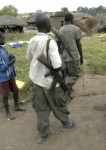
While the death toll from direct violence reaches into the tens of thousands, chronic food and water shortages in the 200 makeshift settlements throughout the north have also exacted a heavy price. In November 2004 alone, MSF recorded staggering death rates in six camps in Lira and Pader districts, with many dying from preventable diseases like malaria, respiratory disease, and diarrhea. Recent peace overtures from both the LRA and the government have not led to a noticeable improvement of the situation for people living in deplorable conditions and in constant fear. GULU district councillors have accused UPDF soldiers of killing civilians in displaced people's camps and in the villages.
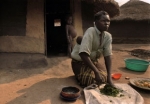
The LC5 councillor for Lalogi sub-county, Ben Acellam, said the UPDF shot dead three women in the sub-county, adding that two of them had children, one aged seven months and another aged two.

He said the UPDF 4th division commander, Col. Nathan Mugisha, had promised to take action against the killers but so far nothing seemed to have been done.
"UPDF soldiers are arresting and killing civilians in the villages on the allegations that they are rebel collaborators," he said during a meeting at Gulu district council hall on Tuesday.

Richard Oweka Kagwa, without giving the number of civilians arrested and killed by the UPDF, said some civilians were killed by the army in Awach and Cwero villages in Aswa county.
The councillor for Koch Goma sub-county, Tom Ocitti, said five soldiers and two civilians died when the UPDF opened gunfire against each other due to poor coordination.
ANOTHER DARFUR?
U.N. Emergency Relief Coordinator Jan Egeland compared the situation to the well-publicised problems in Sudan's Darfur region.
"If they go out (of camps), they are killed as much, or raped as much or worse as in Darfur, by the Lord's Resistance Army and others," Egeland said in a recent statement.
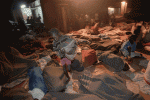
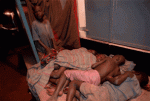
Museveni has rejected the comparison, but that hasn’t stopped aid workers continuing to make it.
“One hundred percent of the population is affected by this kind of crisis -- it’s huge,” Gael Griette, an expert covering Uganda for the European Commission's Humanitarian Aid Office (ECHO), told AlertNet.
Griette said that the entire rural population of Acholiland was in displacement camps.
“People have been cut off from their livelihoods, cut off from everything. They are in camps with nothing, and insecurity is very high,” he said.
“In terms of magnitude and acuteness we can compare what is going on in Northern Uganda to Darfur.
“What is very different between the two crises is the way it is addressed in terms of funding, humanitarian agencies being present in the field, and on top of all it is very different in the way it is being covered in the media.”
Griette said one of the reasons northern Uganda did not get much media coverage was because the LRA had been terrorising the local population for so long that the crisis was seen as old news.
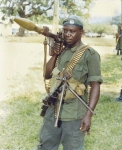
“But this is short-sighted because the crisis has tripled in terms of the number of people affected and multiplied by five or six in terms of acuteness in the past two years -- more or less the same time as the Darfur crisis,” he said.
Politics - Page 8
-
Uganda Army Killing Civillians
-
IS Yoweri Museveni Working for CIA?
Profits, Propaganda and Luxury Goods for the West --
Pacification, Rape and Slavery for the Rest
by keith harmon snow
Brigitte Botsi is a seven year-old girl living in the village of Yalisenge, in Equateur province, Democratic Republic of Congo (DRC). At 4:00 PM on April 30, Brigitte was raped by a soldier. Related directly by e-mail from a humanitarian aid worker based in the area, Brigitte's rape went otherwise unreported. (The aid worker's life would be endangered if name or position were revealed.) The soldier, loyal to the DRC transitional government of President Joseph Kabila, remains unpunished.
On May 6, a girl was raped in public in Mondombe, Equateur. Villagers watched as she was stripped naked and beaten by DRC government troops. The previous day, DRC troops had abducted two young daughters of a family in Equateur--the girls were freed after a foreign aid worker complained to their commander.
Brigitte's people have seen a decade of unspeakable horror: waves of killing, indiscriminate torture, the massacre of hundreds of thousands of refugees, scorched-earth campaigns annihilating entire villages, civilians repeatedly brutalized by all sides.
Everything was destroyed by war. Families gave daughters to the military in return for their lives. Soldiers came and went, leaving girls as young as twelve alone with children of rape that are now starving, the husbands and fathers lost as adult males were conscripted or slaughtered. Teachers' salaries are 1,000 francs a month, less than three US dollars, and teachers weakened by hunger cannot last to noon. Parents in small villages cannot pay school fees of about one US dollar a month per child.
From April to June, Brigitte's village was again invaded. Rebel soldiers of the Congolese Rally for Democracy (RCD) emptied entire villages and terrorized people already traumatized by eight years of unrelenting war. Reports from different parts of Equateur documented both RCD and government troops--officially the Democratic Republic of Congo Armed Forces (FARDC)--looting, destroying and confiscating property, homes and schools; conscripting males for forced labor; raping and abducting women and girls.
"Armed groups have been implicated in human rights abuses ranging from attacks on villages to pillaging, intimidation and harassment," reported the UN Office of Humanitarian Affairs June 14, "while the systematic abduction and rape of women and girls continued, mostly with impunity, throughout the country."
While some 10,000 international "peacekeeping" forces under the United Nations Mission in DR Congo (MONUC) now occupy much of Congo to uphold recent peace accords, powerful interests continue to pillage land and people with impunity. Behind the headlines of "tribal warfare" splashed over western media are secretive intelligence operatives, private military companies, arms merchants, multinational corporations and their agents, and mining executives operating through offshore bank accounts.
CONGO DESTABILIZATION: RWANDA'S SECRET WAR?
On the recent 10th anniversary of the 1994 Rwanda genocide, few noted that Rwanda's war is still being played out on the soil of neighboring DRC. On approximately April 21, troops of the Rwanda Defense Forces (RDF) suffered a military defeat in eastern DRC after a failed operation against soldiers of the Democratic Forces for the Liberation of Rwanda (FDLR), a group seeking to overthrow the one-party regime of Paul Kagame. The Rwandan troops were in DRC in violation of the peace accords.
Observers reported that the FDLR routed the RDF, which retaliated with a scorched-earth campaign against non-combatant civilians. MONUC observers reportedly witnessed uniformed RDF officers commanding troops of the Congolese Rally for Democracy--a force now ostensibly being incorporated into the DRC army under the peace accords.
The international press attributed the retaliation to Rwandan rebel forces in DRC that are universally described as Hutu "genocidiares"--veterans of the Interahamwe militias responsible for the 1994 Rwanda genocide. However, not all Rwandan rebel groups operating in Congo are the same. The US State Department lists the Army for the Liberation of Rwanda (ALIR) as a terrorist group seeking "to topple Rwanda's Tutsi-dominated government, reinstate Hutu control, and, possibly, complete the genocide." But the FDLR is not listed as a terrorist group, and the State Department notes: "Though directly descended from those who organized and carried out the genocide, identified FDLR leaders are not thought to have played a role in the killing. They have worked to build bridges to other opponents of the [Rwandan] regime, including ethnic Tutsis."
In a May 5 interview with this reporter, Jean-Marie Vianney Higiro, leader of the FDLR, warned of a planned destabilization of DRC led by a new military alliance called the Front for the Liberation for Eastern Congo, or FLEC, comprised of Rwandan Defense Forces and their Congolese allies such as RCD, as well as units from Burundi.
Higiro claimed that Rwandan, Burundian and Ugandan forces amassed on the borders signal an imminent invasion of DRC under the pretense of "defending national security" against "genocidiares." Rwanda and Burundi are both currently under Tutsi-dominated regimes, and are said to be playing for loyalty of the Banyamulenge, or ethnic Tutsis of eastern Congo.
The claims were given credence by renewed fighting in DRC's North and South Kivu provinces, and especially the city of Bukavu, beginning May 26 and exploding into all-out war during early June. Fighting involved Rwandan and Burundian soldiers and allied Congolese RCD, against opposed RCD factions and FARDC forces--all in violation of international ceasefire agreements.
"The Front for the Liberation of Congo has not declared itself," said Higiro in a July 2 interview. "Publicly there is no FLEC, but most observers know that the FLEC exists." Higiro and the FDLR believe that Rwanda seeks to annex eastern DRC to create a powerful Tutsi/Banyamulenge empire, rich in natural resources.
The FDLR and local Congolese journalists claim that the Rwandan military and their criminal networks and militias continue to plunder raw materials from the DRC and ship them out through Rwanda. In turn, the Kagame government claims the FDLR seeks to destabilize Rwanda and finish what the 1994 genocide started. As violence escalated this spring, officials in Rwanda claimed "genocide against the Banyamulenge" was underway in eastern Congo.
"We would certainly not use the term genocide," said Andrew Philip, spokesman for Amnesty International's Central Africa Team, in a June 15 interview with this reporter. He dismissed claims by RCD commanders and Rwandan officials, noting that all combatants looted, raped and killed civilians of all communities. "Banyamulenge were not, according to our sources, specifically targeted as an ethnic group by pro-government [DRC] forces in Bukavu."
Philip confirmed that thousands of Banyamulenge have fled DRC citing fears of persecution. As of July 1, the UNHCR counted some 34,000 DRC refugees in Burundi and 3500 in Rwanda. But Philip said that some Banyamulenge representatives condemned claims of genocide as a ploy by forces "seeking to destabilize eastern DRC" through "the exacerbation of ethnic tensions."
He also cited multiple sources in DRC asserting that RDF soldiers were present alongside the rebel Congolese RCD forces.
The UN's IRIN news service reported Dec. 26, 2003 that MONUC commanders attempting to confirm reports of Rwandan troops in DRC were blocked by "certain military commanders" who "denied us access to certain bases and certain camps and prohibited us from speaking with their men."
William Pike of Uganda's New Vision newspaper says Rwanda's involvement "is a common supposition" in eastern Congo. "The problem is an RCD faction composed of Banyamulenge... Rwanda supports them morally, they don't deny that, but do they support them logistically or provide covert leadership? Rwanda denies that hotly."
But FDLR leader Jean-Marie Higiro has no doubts. He said on May 5: "The third DRC war is underway."
The first DRC war was the 1995-6 insurgency against longtime dictator Mobutu Sese Seko (under whom the country was called Zaire), led by the guerilla army of Laurent Kabila and massively supported by Rwanda and Uganda. The second war began in 1998, when Kabila (then president of the newly-dubbed DRC) broke with Rwanda and Uganda, throwing out their military advisors, along with US AID--and cancelled plans to have Bechtel rebuild Congo's mining sector. This was dubbed "Africa's First World War," with Angola and Zimbabwe backing Kabila against (US-backed) Rwanda and Uganda, which first supported anti-Kabila rebel groups in the east, and then intervened directly as well. The country was effectively partitioned, with the government losing control of much of the east. Laurent Kabila was assassinated in 2001, and succeeded by his son Joseph. South Africa and the UN brokered an accord, and peacekeepers moved in--although some key warring parties were excluded from the accords. Now Higiro says the peace is definitively breaking down, as Rwanda makes a play for permanent control of eastern Congo.
Higiro also claimed in his May interview that RDF and Rwandan-allied soldiers were infiltrating the DRC capital Kinshasa with the intent of removing President Joseph Kabila. Higiro's assessment was born out by an attempted coup d'etat against Kabila on June 11, which briefly made world headlines.
"REPUBLIC OF VOLCANS": BALKANIZATION OF CONGO PLANNED?
In a June 6 press release decrying ongoing atrocities committed by all sides throughout the DRC, Survivors' Rights International (SRI), based in Alexandria, VA, called "on the international community to address escalating conflict and the climate of impunity and lawlessness in the DRC, to demand governments and other warring parties to order their soldiers to stop committing acts of genocide and crimes against humanity, and to withdraw troops that remain in DRC in contravention of international peace agreements."
SRI called on the DRC, Rwanda, Burundi and Uganda to immediately demand that "all military leaders order their troops to stop ongoing atrocities and sexual violence by their respective forces, to investigate abuses and suspend or arrest those responsible, and to desist from arming, or otherwise supporting, diverse factions and militias serving as their proxy armies in DRC."
SRI urged all parties to "demand the immediate release of women and girls who have been abducted and who remain captive sexual slaves to government soldiers and affiliated militias, to arrest the perpetrators, and investigate the complicity of military leaders and government officials in condoning or participating in the widespread sexual violence, including rapes, torture, disappearances and abductions of women and girls."
A Human Rights Watch statement of June 12 echoed the SRI demands. It also pointed to accounts of Rwanda grooming Congolese proxy forces. "Local sources claimed to have identified Rwandan military working with the dissident forces," HRW noted, "an accusation Rwanda has emphatically denied."
"Troops allied with Rwanda in eastern DRC are recruiting soldiers today," said FDLR's Higiro on July 2. London-based Congolese journalist Antoine Roger Lokongo reported in his on-line Congo Panorama some 8,000 Rwandan troops crossing into DRC in May and June.
"The Congolese Chief of Staff, Admiral Liwanga confirmed that Rwanda has gone too far already in creating what he called the new 'Republic of the Volcans,'" wrote Lokongo, "using Congolese insurgents fighting under the banner of the so-called 'Front for the Liberation of Eastern Congo' (FLEC). The movement has made a deal with Rwandan Chief of staff James Kabarebe to supply it with logistic support until the Republic of the Volcans becomes a reality."
"Over our dead body!" Lokongo thunders--a sentiment already true for millions of Congolese. In 2001, the International Rescue Committee cited over 3.5 million preventable deaths as a result of war in DRC since 1998: deaths due to hunger, disease and forced displacements. Recent IRC estimates are approaching 5 million.
"The RCD rebel movement in DRC was founded in 1998 by Paul Kagame," Lokongo says. "Since then Kagame has always masterminded and used RCD as a front for the Rwandan occupation of Congo."
And many see the hand of Washington behind Rwanda's perceived designs on Congolese territory. Kagame is a graduate of the US Army's Command and General Staff College, Fort Leavenworth, Kansas. Prior to taking power in Rwanda in 1994, Kagame was head of military intelligence for US-backed Ugandan President Yoweri Museveni's Internal Security Organization.
BLOOD-DRENCHED ITURI: PAWN IN THE SECRET COLTAN WARS?
DRC's Orientale province borders Uganda and Sudan, and its Ituri district is arguably the bloodiest corner of the world. From 1999 to April 2003, at least 50,000 civilians perished in the region. All parties committed summary executions, abductions, disappearances, forced labor, extortion, mass rape, sexual slavery and routine conscription of child soldiers.
Human Rights Watch reported in a 2003 paper, "Ituri: Covered in Blood": "The war in Ituri is a complex web of local, national and regional conflicts, that developed after a local dispute between Hema and Lendu ethnic groups was exacerbated by Ugandan actors and aggravated by the broader international war in DRC."
While the Ugandan army claimed to be a "peacemaker" force in Ituri, HRW said, in reality the Uganda People's Defense Forces (UPDF) "provoked political confusion and created insecurity in areas under its control, helping to launch, arm and train ethnically-based militia..." Fighting continues in the region, despite peace accords.
On February 13, 2004, William Swing, the head of MONUC and UN Special Representative to the DRC, declared from Washington that despite a UN arms embargo, "the flow of weapons into the region, purchased through the illegal harvesting of precious resources, is virtually unhindered."
MONUC forces were increased in Ituri in June 2003--but they have also been accused of atrocities. MONUC soldiers reportedly raped Congolese girls and spawned a sex-for-survival trade as women and girls impoverished by war sold sex for a pittance to feed their families. Some western media reported the MONUC sex scandal, but mass rape and prolonged sexual slavery committed by all sides against tens of thousands of Congolese women largely remains in whiteout.
Ituri is rich in petroleum, gold, ivory, diamonds, timber and columbo-tantalite (coltan)--raw materials coveted by international commodities traders. In "Blood for Mobile Phones," from his Black Book on Brand Companies, German journalist Klaus Werner tied corporations like Bayer AG to the coltan-scramble bloodbath in DRC. Coltan micro-capacitors are used in cellphones, Sony Playstations, laptop computer screens, and high-tech info-warfare gadgetry.
Observers say the UPDF and RDF have stripped coltan, gold and diamonds out of eastern DRC as rapidly as possible. Rights groups accuse UPDF and RDF troops of forcing prisoners under inhuman conditions to mine coltan later shipped out of Rwanda and Uganda. Before the UPDF and RDF themselves came to war on Congolese territory over whether Uganda or Rwanda would control eastern DRC, both were involved in directly overseeing the mining of coltan. Rwanda was even accused of shipping in Hutu prisoners charged in the 1994 genocide for coltan mining, as well as using captured Congolese.
UPDF troops that helped topple Congo's longtime dictator Mobutu and later occupied eastern DRC have also been cited for some of the most egregious atrocities by numerous rights bodies.
A 2002 UK Parliamentary report, "Cursed by Riches: Who Benefits from Resource Exploitation in the DRC?", documents massive resource plunder by both UPDF and RDF networks in Congo. Israeli military agents and businessmen have also been accused of profiteering in the region.
Belgian diamond import statistics show remarkable quantities of diamonds coming from DRC, Uganda and Rwanda. Exports from Rwanda and Uganda increased markedly during military occupation in DRC since 1998.
Cited in the UN's October 2002 "Final Report of the Panel of Experts on the Illegal Exploitation of Natural Resources and Other Forms of Wealth of the Democratic Republic of the Congo," UPDF Gen. Salim Saleh, half-brother to Ugandan President Museveni, is accused of maintaining a network of extortion and racketeering in Ituri. The UN report estimates Rwandan forces made at least $250 million from exploiting Ituri's resources.
Other factions also got in on the coltan scramble. The government of Joseph Kabila has recently rewarded Congolese military leaders like Jean Piere Bemba, cited by rights groups for egregious atrocities, with posts in the transitional government; Bemba channeled coltan through criminal networks linked to the Central Africa Republic.
Several western corporations eye an eventual bonanza in Ituri--and many of them are conveniently linked to the international arms trade and mercenary outfits. Barrick Gold is a long-time stakeholder in Ituri's Kilo Moto gold mines. A Canadian-based multinational, Barrick's principals include former prime minister Brian Mulroney, former US president George HW Bush, former Tennessee senator Howard Baker, and Vernon Jordan, Bill Clinton's lawyer and confidant. Barrick has multiple joint ventures with the South African mining giant Anglo-American. Barrick's founder is Adnan Khashoggi, a Saudi billionaire arms trafficker, famous for his illegal weapons sales to Iran in the Reagan era.
In 1997 Canadian-based Heritage Oil & Gas began petroleum explorations with the support of the Museveni government on the Uganda side of the border, and Belgium's De Standard reports they have now also secured DRC concessions through Joseph Kabila. Uganda's New Vision newspaper reports sizeable petroleum and natural gas reserves discovered in the Semiliki Basin, beneath Lake Albert which straddles the DRC-Uganda border.
Heritage Oil & Gas was founded by Tony Buckingham, an executive linked to a confusing network of front companies and offshore island holdings. De Standard reported June 19, 2003, on Heritage Oil's maneuvers in DRC and Uganda, and its links to companies like Branch Energy and Diamond Works, both exposed for operations in war-torn Angola and Sierra Leone. Buckingham is a veteran of the UK's elite SAS military corps, and played a founding role in the private military companies Executive Outcomes of South Africa and Sandline International. De Standard suggested that Buckingham seeks the pacification of Ituri to exploit minerals in the region.
Buckingham's ties to US government officials are detailed in Wayne Madsen's book Genocide And Covert Operations in Africa, 1993-1999 (Edwin Mellen Press, 1999). The mercenary soldier Simon Mann arrested this March with a posse of followers in Zimbabwe (allegedly en route to institute a coup in Equatorial Guinea) is a co-founder with Buckingham of Executive Outcomes.
"The situation in Ituri remains unstable," wrote Survivor's Rights International on June 6, "with recurring acts of genocide and crimes against humanity being perpetrated by miscellaneous forces on their opposition ethnic groups, many of which have been armed, supported and manipulated by the Ugandan People's Defense Forces. The indigenous Mbuti pygmies continue to suffer the brunt of abuses from all sides."
On July 9, Nairobi's East African Standard reported that hundreds of refugees fleeing fresh fighting in Ituri had crossed into Uganda.
THE GOAD OF SHABA: DIAMONDS, COBALT, URANIUM
Even where the government has control, things are grim in Congo. Atrocities by DRC soldiers (FARDC) are widespread throughout the country. The Congolese Union for Democracy and Social Progress, a civil opposition group, reported some 100 government Rapid Intervention Police attacking students protesting at two universities in Kinshasa in April. In both incidents hundreds of students were reportedly attacked; scores were raped and tortured.
The IMF and World Bank favored Kabila's transitional government with loans worth $ 1.2 billion in June 2002, while Sweden, Belgium, France and South Africa loaned some $522 million. In January, 2004, the Belgian government authorized the dispatch of 190 military advisers to Congo to train a new Congolese military brigade in Orientale.
South Africa and DRC recently signed a bilateral agreement on defense and security. DRC also signed a $ 8.4 million deal with South Africa to rehabilitate the state mining company GECAMINES.
Chairman of GECAMINES from 1999-2001, Belgium's George Forrest controls the most diverse private mining portfolio in the DRC. One of his partners in DRC is the OM Group of Cleveland, Ohio.
Forrest's roots in DRC predate 1945, and his companies outlasted the long Mobutu dictatorship and subsequent wars. Forrest also owns Belgium's New LachaussŽe company, a leading manufacturer of cartridge casings, grenades, light weapons and cannon launchers. His George Forest Group also has munitions plants in Kenya and Tanzania.
Forrest's mining interests include copper, cobalt and germanium concessions in Shaba, DRC's southern province, long the site of separatist movements..
Shaba's plight also revolves around factions seeking to maintain or wrest control of resources. Shaba (formerly known as Katanga) is rich in diamonds, cobalt, copper, palladium and germanium. Uranium from Shaba was used in the bombs dropped on Hiroshima and Nagasaki.
Cobalt is a strategic alloy used in the aerospace and defense industries, and was stockpiled by the US Defense Logistics Agency during the Cold War. Maintaining Shaba's "cobalt connection" was paramount to the Mobutu dictatorship. Keeping the region safe for Mobutu's cobalt empire was long the purview of Lawrence Devlin, a CIA operative in Shaba later employed by diamond magnate Maurice Tempelsman.
Falling within the Kinshasa government's sphere of control, Shaba has seen its share of repression and warfare. The Kabila family is from Shaba, and Kinshasa maintained control the region in the recent years of war with the aid of troops from the allied Zimbabwe Defense Forces (ZDF). The ZDF has officially pulled out of DRC, but unconfirmed reports suggest some ZDF troops remain.
"An elite network of Congolese and Zimbabwean political, military and commercial interests has maintained a grip on the main mineral resources of government-controlled areas," concluded the UN Panel of Experts in 2002.
The UN reported this network had transferred ownership of at least $5 billion in assets from the state mining sector to private companies from 1999-2002 with no benefit to the DRC. "The network's representatives in the Kinshasa Government and the Zimbabwe Defense Forces (ZDF) have fueled instability, by supporting armed groups opposing Rwanda and Burundi," the UN report found.
A few notable businessmen said to be calling the shots in Shaba are American Maurice Tempelsman, Zimbabwean Billy Rautenbach, South African Marc Rich, British John Bredenkamp, Swede Adolph Lundin and Jean Raymond Boulle.
Tenke Mining, owned by Swedish mining magnate Lundin is one of some 15 multinational mining companies partnered with GECAMINES in Shaba. Lundin is called a longtime associate of George HW Bush; African Confidential reported in 1997 that the ex-president telephoned Mobutu on Lundin's behalf after the dictator had threatened to terminate a mining contract.
Pardoned by outgoing President Clinton for tax-evasion charges, Marc Rich operates the Swiss-based Glencore company.
Rautenbach, a former GECAMINES director, and Bredenkamp teamed up with Zimbabwe's strongman Robert Mugabe to plunder Shaba behind ZDF troops. The Bredenkamp family's Brecon Mines Ltd. is partnered with GECAMINES. Africa Confidential and independent newspapers in Zimbabwe have reported on Bredenkamp's role in shipping weapons to Zimbabwe for probable use in the Congo.
Tempelsman is affiliated with the Oppenheimer/DeBeers diamond conglomerate of South Africa. The executive privileges he enjoyed during the Clinton years were reportedly secured through a romantic interlude with Madeleine Albright. Tempelsman accompanied Clinton on his 1998 Africa tour, sailed with the Clintons off Martha's Vineyard, and met with Clinton on Air Force One. He is said to employ CIA veterans who protected the Mobutu dictatorship as his private staff for his Congo operations. Tempelsman is a trustee of the Harvard AIDS Institute and Africa-America Institute, and former chair of the Corporate Council on Africa.
The Corporate Council on Africa represents 85% of all US private-sector investment in Africa. Members include Asea Brown Baveri (whose former director is Defense Secretary Donald Rumsfeld), Halliburton (Cheney), the Washington Post Company, Raytheon, Military Professional Resources Inc., and oil majors such as ExxonMobil, Chevron-Texaco, Conoco-Philips, Sunoco and Shell.
According to Wayne Madsen, the Virginia mercenary firm Military Professional Resources Inc. (MPRI) supported Kagame's US-backed invasions of Rwanda (from Uganda in 1994), Zaire (1996) and then Congo (1998).
The Africa-America Institute, another industry interest group, recently presented the AAI African National Achievement Award for 2002-3 to President Museveni of Uganda for "history-making advances that justify optimism for the future of the African continent."
AAI trustee Gayle Smith in 1998 was appointed special assistant to President Clinton and senior director for African Affairs at the National Security Council, a position where she negotiated a cease-fire between Uganda and Rwanda, after the ex-allies battled for the spoils in DRC.
U.S. SUPPORTING TERROR
On March 9, 2004, Le Monde published a report by French anti-terrorist judge Jean-Louis Bruguiere, who found that Paul Kagame, then commanding the Rwandan Patriotic Front (RPF), a Tutsi-led guerilla group operating with the support of Museveni's Uganda, gave orders for missiles to be fired at the airplane carrying the Rwandan and Burundian presidents, both ethnic Hutu, on April 6, 1994. The assassinations provoked the Hutu-led genocide in Rwanda--which left up to 800,000 dead, overwhelmingly Tutsis. In the wake of the genocide, the RPF took power, and hundreds of thousands of Hutu fled Rwanda for Congo (then Zaire).
Critics now say Kagame is cynically using the 1994 genocide to deflect scrutiny of his own war crimes. Human rights organizations have documented RPF atrocities, with perhaps hundreds of thousands of killings from 1990 to 1996. In 1994, UN Special Rapporteur Robert Gersony documented "an unmistakable pattern of RPF killings" of Hutu refugees returning to Rwanda: the report was quickly buried. Amnesty International and other rights groups documented killings of hundreds of thousands of Rwandan refugees (mostly Hutu) in DRC by the UPDF/RPF-led insurgency.
Wayne Madsen reports that Halliburton subsidiary Kellogg Brown & Root set up a military base in southwestern Rwanda in 1995 in preparation for the US-backed invasion of Congo/Zaire to topple the abandoned Mobutu dictatorship.
Amnesty International in 2002 reported US Defense Intelligence Agency (DIA) and Special Forces' involvement in the 1996 invasion of Congo/Zaire. The report said that DIA assisted Rwandan and Ugandan forces through a program code-named "Falcon Gorilla." In 1997, the DIA held a Pentagon symposium on privatization of African security operations with Executive Outcomes, Sandline International and mineral interests.
Madsen also maintains that Carla del Ponte, special prosecutor for the International Criminal Tribunal on Rwanda (ICTR) was removed due to her unwanted scrutiny of RPF atrocities. In 1997 and 1998, when UN investigators turned their eyes on the RPF, the US, through then-Secretary of State Madeleine Albright, pressured the ICTR to halt the investigation, Madsen claims. Kagame blasted efforts to investigate RPF atrocities as "evidence of the politicization of the tribunal's functions."
The Pentagon maintains International Military Education and Training (IMET), Joint Combined Exchange Training (JCET), Africa Crises Response Initiative (ACRI), and African Contingency Operations Training Assistance (ACOTA) programs with both Rwanda and Uganda. The Washington Post's Lynne Duke's reported August 16, 1997, that the RPF benefited from counterinsurgency and combat training from US Special Forces. The Falcon Gorilla operation in support of the Rwanda-Uganda intervention in DRC reportedly came under the purview of JCET.
Gen. Charles Wald, head of US operations in Africa (under the Pentagon's European Command), has substantiated direct US support for the Museveni government's fight against the Sudan-backed Uganda rebel group Lord's Resistance Army (LRA), defined as a terrorist organization by the US. The LRA are a brutal and fanatical group, but critics in the Ugandan opposition charge Museveni exploits their terror for propaganda purposes--and that some atrocities attributed to the LRA were carried out by UPDF troops.
US Ambassador to Uganda Jimmy Kolker told Voice of America April 2 that US aid has consisted mainly of trucks and radios, along with training. He said its total value was some two million dollars. He dismissed reports of greater US military assistance as "grotesquely exaggerated."
But it is clear that the US has tilted to Uganda and Rwanda in Africa's ongoing First World War. Rwanda's Paul Kagame spoke at least twice at the Carr Center for Human Rights at Harvard University, and has met with George HW Bush at the James Baker Institute for Public Policy in Houston, and at the Council on Foreign Relations. Kagame was a guest, with Joseph Kabila, at a Washington prayer breakfast soon after George W Bush assumed office. Ugandan's Museveni was a guest speaker at the Center for Strategic and International Studies (CSIS) in Washington DC on June 11, 2004.
Rwanda and Uganda continue to be rewarded with World Bank and IMF loans, despite accusations that funds are diverted to purchase military equipment and prosecute war in their own and neighboring countries. One recent Rwanda grant was a $20 million aid package of June 15, 2004. According to Congolese journalist Lokongo, the UK government has given up to 60 million pounds a year in "development aid" to Rwanda and Uganda.
And US military involvement in the region is about to deepen. Preceding his trip to Africa in July 2003, President Bush announced a $100 million aid package for east African countries to fight terrorism, pointing to greater US strategic interest in the region. "We will work with Kenya and Ethiopia and Djibouti and Uganda and Tanzania to improve capabilities... We will give them the tools and the resources to win the War on Terror."
NEXT MONTH: THE FRENCH CONNECTION ____________________
PHOTOGRAPHS:Images from Central Africa
1. Supporters of Robert Mugabe gather at a pro-government rally in Harare, Zimbabwe, in June 2000. c. keith harmon snow 2000
2. Directors of Royal/Dutch Shell Hans an Luijk (3rd left) and Bernard Legrand (5th left)-- Shell General Manager for Africa -- with Paul Kagame.
3. Paul Kagame with several officers at a rally in Kigali.
5. Top Shona commanders of the Zimbabwe Defense Forces at a pro-Mugabe rally in Harare, Zimbabwe, at the height of Zimbawe's involvemen in the DRC, June 2000.
6. Family struggles to cross a bridge in Ituri in 1991, where planks had been mostly stolen as infrastructure in Zaire (now DRC) totally deteriorated under Mobutu Sese Seko's dictatorship.
7. Wreckage from the plane carrying the two presidents of Rwanda and Burundi that was shot down on approach to Kigali airport on April 6, 1994, that sparked the ongoing conflagration in the great lakes region.
8. UPDF soldiers ride aboard a troop carrier in Uganda after a UPDF celebration of their warfighting capabilities.
9. Tony Buckingham (far right), chairman of Heritage Oil and Gas exploration program in the Semiliki basin, and delegation meeting with Ugandan President Yoweiri Museveni (shaking hands) in a Kampala, July 1998, as the second war for DRC was getting underway.
10.UPDF soldiers ride on a troop carrier in Uganda after a celebration of their warfighting capabilities.
11.Congolese refugees in Zambia forced to flee Shaba during the wars for DRC work under brutal conditions (with malaria and scorching temperatures) all day long, scavenging and hauling scrap metal -- weighing hundreds of pounds -- to bring them less than $5 daily.
12. The open pit mines (background) are an environmental nightmare.
-
Uganda: Children suffering gross abuses in northern conflict
(IRIN) - Thirteen-year-old Adong B fought for the rebel movement, the Lord's Resistance Army (LRA), for two years after being kidnapped in 2002 from her village in Koch Goma, in northern Uganda’s Gulu district.
In February, she was rescued by the Ugandan army and placed in a rehabilitation camp in Gulu town, 380 km north of the Ugandan capital, Kampala.
Speaking to IRIN on Monday in Gulu about her ordeal as a child soldier, she said: "Those who couldn’t carry on walking because of swollen feet were battered to death. I was forced to kill one girl who failed to walk."
Beatrice A, 14, was abducted in February 2004 and made to work as a porter for the rebels. "We walked for long hours, and when you failed to walk you were beaten," she told IRIN on Monday in Gulu. "Those who failed completely to walk were killed. Because of thirst, we sometimes had to drink our own urine to survive."
The use of child soldiers in northern Uganda's 19-year-old conflict has ripped apart countless families and destroyed innumerable childhoods. Relief agencies have testified to children being recruited both by the government and the LRA, as well as being civilian victims of violence.
However, the Ugandan government has vehemently denied the existence of child soldiers in its ranks, and insists that the Uganda People’s Defence Force (UPDF) has never knowingly recruited any children into its ranks.
"The UPDF does not have a policy of recruiting underage soldiers," Maj Shaban Bantariza, a UPDF spokesman, told IRIN. "We have never knowingly hired a child to serve in our ranks.
"We have had occasions when telling somebody’s age is difficult, and we have taken up recruits who are slightly underage," he admitted.
In such cases, Bantariza insisted, the UPDF had done everything in its power to prevent these children from entering the army.
"Last year we got 30 recruits who had been duly recommended by the community councils, but after scrutinising them [we found] they were underage, and their applications were turned down," he said.
NGO officials disagree. Father Carlos Soto, of the Justice and Peace Commission in the Gulu archdiocese, told IRIN that it was public knowledge in northern Uganda that the UPDF was using child soldiers to fight the LRA.
"The Acholi [ethnic group in northern Uganda] in the IDP [internally displaced persons] camps say these are destitute boys who have nothing to do – it is a way for them to have a job," said Soto, who has lived in the north for over 15 years.
Chulho Hyun, a spokesman for the UN Children’s Fund (UNICEF), told IRIN the organisation was concerned about the use of child soldiers in the country.
"Uganda is a signatory to international protocols and, therefore, efforts should be intensified to ensure there are no children in the armed forces," Hyun said.
"We are particularly worried about the recruitment of children into LDUs [local defence units], and are actively involved in discussions with the government about [the] prevention of child recruitment," he added.
In 2003, Human Rights Watch (HRW), a New York lobby group, found evidence of Ugandan children being recruited into LDUs, supposedly to provide security to local villages, but reportedly used to fight alongside the UPDF against the LRA.
A report in January 2004 by a London-based NGO, Coalition to Stop the Use of Child Soldiers, carried similar findings: "On a recent visit to Lugore training camp 120 children [were identified] among the recruits. Reliable sources also identified UPDF recruits among demobilised child soldiers in Yumbe."
The report added that international organisations had not been granted access to many military training camps where it was suspected that more children were held.
Hyun said, however, that the LRA was by far the worst offender when it came to the abuse of children.
Childhoods of abuse
According to the UN in 2004, more than 80 percent of LRA fighters were abducted children - the rebel group has kidnapped more than 20,000 children since 1988. This has left a gaping hole in the traditional family system of northern Ugandan society.
"Thousands of children have been raped, brutalised, drugged and forced to inflict unspeakable violence on others. The result: a generation whose childhood has forever been stolen from them," wrote Jan Egeland, UN under-secretary general for humanitarian affairs, in the foreword to the 2004 book published by IRIN: "When the Sun Sets, We Start to Worry: An Account of Life in Northern Uganda".
In a 2004 report, HRW said rebel commanders considered child soldiers "cheap, compliant and effective fighters".
Former child soldiers report that children are frequently killed or left for dead if they are either injured in battle, become too weak to keep up with the rebels or refuse to perform tasks allocated to them by LRA commanders.
Another survey in November 2004 by the UK-based scientific journal, the Lancet, found that more than half of 301 child soldiers surveyed – all of whom were abducted by the LRA, at an average age of 13 – had been seriously beaten.
Seventy-seven percent had witnessed another person being killed, 39 percent had killed another person and 39 percent had abducted other children. Sixty-five percent of the children had been forced into military training. More than a third of the girls had been raped, and 18 percent had given birth while in captivity.
Of the 71 children who agreed to complete a questionnaire to assess post-traumatic stress disorder, 69 had clinically significant symptoms, the Lancet reported.
"Since these former child soldiers are often blamed and stigmatised for the countless atrocities they committed – mostly against their own people – their psychological recovery and reintegration can be seriously complicated," the journal warned.
Relief workers in Uganda say children are most susceptible to abduction at night, when the rebels carry out their raids.
Each night, several thousand children, known as “night commuters”, leave their homes for the relative safety of larger towns such as Gulu. They sleep in hospitals or schools; failing that, they sleep rough on shop verandas.
Albert, a father of seven who lives on the outskirts of Gulu, takes care of a total of 18 children, all of whom join thousands more on the nightly trek to the heart of town for safety.
"I am always worrying about the children," he told IRIN. "They are too young to be on their own. There are also a lot of dangers at night. Some have been bitten by snakes, the older girls are disturbed by men and sometimes they are attacked by robbers."
The LRA, led by Joseph Kony, operates in northern Uganda, reportedly from bases in southern Sudan. In 1988, it began its campaign to remove the government of President Yoweri Museveni, ostensibly to replace it with one based on the Bible’s Ten Commandments.
Over the years, however, the rebel group has gained notoriety for its brutality, and it has regularly used torture, rape, mutilation and abduction as weapons of war.
Observers believe that the use of children by the LRA is a deliberate strategy - as the most vulnerable members of society they can be forced to become sex slaves, porters, domestic servants and soldiers.
Various NGOs have set up programmes to try and demobilise, rehabilitate and reintegrate former child soldiers, but the children are at times rejected by their communities as murderers. HRW reports that the children are frequently re-recruited by rebel forces.
Olara Otunnu, the UN’s Special Representative of the Secretary-General for Children and Armed Conflict, said in February that the international community needed to move its focus from developing standards on the protection of children to ensuring they were actually enforced on the ground. The tens of thousands of child soldiers in northern Uganda are just a fraction of the global total, which the Lancet puts at 300,000.
-
THE FATE OF BLACK ANARCHISM
In years past, when the slavery of the children of Africa was carried out by chain and whip instead of uniforms and patrol cars, black people in Brazil had only two places where they could be – in the Senzala or the Quilombo. The Senzala was a small hut placed outside the master's house, a shack in which the slaves would stay from after sunset to before sunrise, chained to the walls and behind locked doors. The Senzala was their home; there they raised their children and grew old. In secret, they practiced their language, religion and culture away from white eyes. The window of the senzala would always face the main quad of the plantation where a single post could be seen emerging from the earth's belly. The Pelourinho – the mast in which rebellious slaves where tortured into submission or death, whichever came first. This was the Senzala.
But, every once in a while, a laborious and dedicated group of slaves would defect from the generosity of the slave master's whips and chains and senzalas, and go into the jungle. They would run, day after night after day after night, into the mata, deeper into the forest; away from the treacherous Capitaes to Mato, the black or mulatos overseers responsible for capturing escaped slaves. In the jungle, they looked for hope. In the jungle, they looked for freedom. In the jungle, away from the white man, they looked for the Quilombo.
Quilombos were city-states created in the heart of the mata by escaped slaves. The most famous - the largest and the one whose name was whispered in secret in the dark by those in search of freedom - that was Palmares. Palmares had a estimated population of twenty to thirty thousand, structured in eleven different villages. In Palmares, as in other Quilombos escaped slaves held the majority. Natives and poor whites were also accepted into the Quilombo, with and shared the same rights and duties as anyone else. Decisions where made by village assemblies, in which every adult, man or woman, of every race, could (and most would) participate.
No, Palmares was no utopia. It was no communist society in which the decisions where as horizontal as possible and in which all were seen as equal. Palmares had chiefs, one for each village. The chief of the capital, Macacos, was the king of Palmares. But this is neither here nor now. The now is the quilombo as opposed to the senzala.
Palmares died in flames. It fought until the last person was dead. It had been fighting for its sovereignty and independence for over one hundred years. It gave its blood to defend what it cherished most – its freedom and its self-determination.
Whatever drove the Palmarinos to fight is what I am interested in talking about. A friend of mine said something that struck a cord in me. He said: “People are always talking about dying for this or that. You gotta die for the cause if you are militant enough, if you are really bad ass you should die for your beliefs. But nobody asks, what are you living for? Not dying, but living – what is your life for?”
The Palmarinos were living for something. They were living for their freedom and their collective autonomy. They were living for their right of self-determination, to do away with the chains that held them slaves in the past and to decide by themselves the path of their life. If they died fighting for that, they died for what they were living for. They died the death of free people.
We now call ourselves Anarchists. We say we want the end of all chains and the extermination of all oppression. Yet, in the Anarchist “movement”, black folk and other folks of color are still in the senzala. We are still having to disguise ourselves, call whitey “Massa” and chain ourselves to the wall. No, don't talk about racism unless is in that very abstract sense of “we-are-all-equal-let's-sing-kumbayas-and-pretend-the-color-of-our-skin-does-not-matter” racism. While there might be nobody yelling “die, nigger, die!*”, you can hear a very clear “shut the fuck up, nigger, just shut the fuck up.”
We pretend that racism is just a minor problem, something that, like the Leninist State, will wither away if we will it to. The intrinsic racist characteristics that infect Anarchism, specially North-American Anarchism, cannot be questioned without one being seen as some kind of authoritarian nationalist, or even worse, a Maoist. Red-baiting, of all things!
Like in the real senzala, our resistance to racism needs to be covert. It needs to be hidden and made like it is something else. It cannot be what it needs to be, it cannot do what needs to be done, or the senzala would break apart and the master's house would be set aflame. No. Like capoeira, our fight against white supremacy inside North American anarchism needs to disguise itself as a dance in order to become a martial art.
And you know how the rap goes: if we talk about empowerment we are power hungry. If we assert our self-determination, we are authoritarian nationalists. When we expose how white Anarchism is, elitist white Anarchists generally come with excuses like “Hey, I saw a black anarchist once!” or the classic, “well, we need to outreach to communities of color.”
Let me tell you something, the reason why the masses are not flooding to your Anarchism is exactly that one – it is your Anarchism. It is a white, petty-bourgeois Anarchism that cannot relate to the people. As a Black person, I am not interested in your Anarchism. I am not interested in individualistic, self-serving, selfish liberation for you and your white friends. What I care about is the liberation of my people. The collective liberation of the children of the African Diaspora, those that have been beaten down and treated worse than dogs all across the world.
So, no, we are not interested in your anarchism. We need to create our own. Understand this, if the whites in Palmares were allies and died with the blacks and the natives it is not because they invited the blacks and the natives into their structure, into their society and said unto them: “We are all equal.” It was because the blacks and the natives created their own structure - their own society - in which power relations were different so that whites could not longer by the sheer force of their privilege impose their view of how the society should be run. To try and integrate people of color in your society or your movement, like there would be no culture clash and no confrontation – it is naive, senseless and can lead nowhere but into deception.
In the senzala of contemporary Anarchist theory and practice, the only place for Blacks and other folks of color is the chain in the wall or the Pelourinho. To question the structure of this “movement”, why is it really composed mainly of white suburban boys, is a invitation to the Pelourinho - or to the Quilombo.
Some escaped slaves decided to create their own Quilombo in the forest of North America, and they called it A.P.O.C. - Anarchist People Of Color. APOC was a necessary step on the beginning of the self-determination of people of color inside the movement. This self-determination we seek is to analyze the problems of race inside and outside the movement in our own perspective. To create our own analysis of authority and what it means for us to be Anarchists. What does it mean for those that have always felt odd at an Anarchist event while looking around and thinking are they made the wrong turn somewhere and ended up in a white only area of segregated Mississippi.
When an anarchist tells me about how the cops are fascist pigs, I stop for a second and think. A lot of times I'll of some experience in a protest against this or that corporate meeting or something, in which the cops tear gassed the crowd and whoop some ass and I think, man, you got it easy. I remember in my neighborhood in Brazil, where if you got only an ass-whooping, you would considered yourself lucky. I remember the day they shot my uncle dead. I remember this one cop that used to follow me around and scare the life out of me because I thought he was going to cap me and there no way in hell I was approaching no authorities to complain because then I would surely wind up dead. I remember the police invading my grandma's house, guns in hand, while my cousin was still a baby and was sleeping in my aunt's bed. Even here, in my neighborhood in East Palo Alto, you can always hear the cops fussing around at night and you know they are not looking for no black-bloc kid from some protest or another. So tell me again how the cops are fascists...
The fact is, we know oppression. We live it, we experience it. In one form or another, one extreme or another. We do not conceptualize it. We do not sit down and intellectualize about pain because our people have been hunted down and shot, and burned and beaten and we lost the need to understand pain philosophically when we learned it physically.
So why are the people not filling the ranks of the Anarchist movement? What it is that prevents those people of color that have been feeling the brunt of police brutality, and have been living off the scraps of what capitalism leaves behind, why have they not joined the movement?
The answer is simple: because is not their movement. It can never be their movement while it is being created by and for white middle-class kids with a Jesus complex who think they can save the world (or the ones with Buddha complex who think they can get wet by talking about water). You cannot hustle the movement and you cannot hustle the people. Revolution is not a game in which you can pretend to listen to the voice of the people of color only when is convenient and shut them off when they start questioning your privilege.
APOC, as any revolutionary step, spurned an immediate reaction, a counter-revolutionary step. The amount of voices in the Anarchist “movement” that have been raised to criticize, put down or, in any other form, discredit APOC (most, if not all of them, white, by the way) have been, if small, consistent and bold. To incur and cite these criticisms is irrelevant to today's discussion. I am not here to defend APOC. I am here to talk about why I don't need to do it.
APOC is our Quilombo. Our keep, our fortress, where we can meet as people from oppressed background and not only share our experiences and how they are relevant to each other, but also how they are relevant in the larger scheme of things. APOC is more than a safe zone for people to feel good about not being in a room without white folk, but is a conscious project of self-determination for people of color. It is a step closer to our freedom as a people and the materialization of the idea that community comes from something in common, something we can share.
No, APOC is no utopia. It is not even close. But that is neither here nor now. We may stumble, we may fall, we may even break our heads wide open. But at least we are walking on our own two feet.
It is pointless for me to try and convince white Anarchists of the need for APOC because white anarchists have not experienced what we a people of color have experienced. It is like trying to convince my boss of the need for Socialism – a more often then not fruitless endeavor.
And while there are white Anarchists out there who remember that only the oppressed can liberate themselves and the end of white supremacy cannot be brought about by white people – there are those that, in their arrogance and shortsightedness, will not yield and cannot tolerate the thought that maybe there is something that Anarchist people of color need to discuss that does not include white people.
And if, for a moment, I thought that APOC needed to be approved by the white anarchist scene that would be the moment in which APOC would lose its appeal to me. Because is not about being accepted, being cherished, being “on the good side” with the white Anarchists – that is the Senzala. It is about self-determination and it is about resistance. It is about creating our own culture, our own analysis and dictating our own future. APOC for me is not about seeking a way to make white people love us, or hate us.
I have to tell you a secret about APOC: it is not about white people at all. It is not, and it should not be ever. I am tired of talking about white people, thinking of white people, analyzing white people and worrying about white people. I want to know what I have in common with my Korean sister and my Guatemalan brother. I want to know about the great struggles for liberation in Uganda and how the Filipino resisted imperalism. What can we learn from each other as people of color? What does my bairro in Rio de Janeiro has in common with a Latino barrio in East Side San Jose?
This is something I wrote for my sisters and brothers at APOC. We need to understand ourselves in order to understand the world around us and be able to fight and destroy the bourgeois plague which eating away our homes, our lives and our cultures.
As a black person, my anarchism is Black Anarchism. As a member of the exploited class, my anarchism is Class-Struggle Anarchism. As a person who wishes for a better future, my anarchism is Anarchist-Communism.
Vamos a ela, porque temos muito, muito para construir.
Não tá morto que peleia!
Viva a Anarquia!
-- Pedro Ribeiro (Furious Five Revolutionary Collective)
San Jose, CA
-
Uganda Fedayin storm British Embassy
By Solomon Muyita, Simon Kasyate, Charles M. Mpagi & Agness Nandutu
KAMPALA — Demonstrators protesting to what they called “unfriendly remarks against the sovereignty and independence of Uganda” yesterday stormed the British High Commission and the Parliament in Kampala.

The crowd of several hundreds, calling themselves Concerned Patriots, condemned remarks by a British minister who recently questioned Uganda’s commitment to democracy and Irish rock star and aid campaigner Bob Geldof who accused President Museveni of wanting to rule for life.
The demonstrators first marched through the city, before camping outside the British High Commission. They later moved to the Parliament, which is about 100 metres away.
Many were walking, while some clung to several trucks in a convoy.
They blew whistles, chanted slogans in support of the government and danced to music blaring from a truck.
Many were draped in dry banana leaves (essanja), the symbol of the campaign for a third term for President Yoweri Museveni.
The demonstrators carried tree branches, banners and placards denouncing remarks made against what is widely believed to be Museveni’s attempt to cling onto power through a constitutional amendment. “We support our system until 2011; Long Live Lt. Gen. Yoweri Kaguta Museveni,” one placard proclaimed.
The demonstrators denounced what they called attempts by Britain, Uganda’s former coloniser, to recolonise the country.
“We say NO to recolonisation,” read one placard.
“You never gave us democracy yet you colonised us,” another said.
Some others read: “You called Amin a gentle giant”; “Keep your donations, we retain our freedom”; “Cheap politicking should not be part of UK led economic commission”; “We fought for our freedom, we died as you looked on. Keep off.”
Mr James Mutumba, 35, who described himself as the Chief Operations Coordinator for the demonstration said: “We are here because the British are belittling us; they forget that Uganda is a state.”
Some of the placards were aimed at Geldof.
Geldof recently criticised Museveni at the launch of the report of the UK-led Africa Commission. He said, “The president of Uganda, who implemented poverty measures and AIDS measures that all worked with debt relief, is now trying to be president for life. Get a grip Museveni. Your time is up, go away.”
Some demonstrators’ placards read: “Geldof sober up and shut up”; “NO to drug addicts and Rock Homos”; “Geldof, Africa is not a drama theatre, let Museveni stay”; and “Geldof, know that Museveni is a freedom fighter not an actor.”
For about 30 minutes, the demonstrators interrupted movement in and out of the High Commission on Parliament Avenue. One of their leaders was let in to hand over a statement addressed to the High Commissioner, Mr Adam Wood.
The statement said the demonstrators had been offended by remarks made by Bill Rammell, a minister in the Foreign Office, and musician Geldof.
Rammell was recently reported to have told the British Parliament that his government was concerned about “countries like Uganda and Zimbabwe, where poor adherence to inernational human rights standards, and a lack of commitment to democracy, good governance and the rule of law, cause us particular concern.”
The demonstrators’ statement said, “We are citizens of Uganda who are deeply concerned and bothered by these remarks and the circumstances under which they are being made. We should like to request you to please kindly and urgently communicate to the government of the United Kingdom our extreme displeasure.”
The statement signed by Mr Paul Musamali and Mr Odur Byaruhanga, the chairman and secretary general of the little-known group, added, “We condemn the remarks in the strongest possible terms and dismiss them with the contempt they deserve.”
The demonstrators were later denied entry at Parliament, although Musamali and a few leaders were allowed in to present a copy of their one-and-a quarter-page statement to the Speaker, Mr Edward Sekandi.
In a brief address to the leaders, Sekandi called upon Ugandans not to panic adding that foreigners cannot influence Parliament’s decisions.
“I agree with the petitioners that Uganda has to be respected as a sovereign country. Uganda has its constitution and is able to handle the constitutional amendments,” he said.
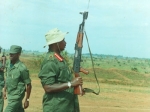
He said MPs can ably handle the constitutional amendments and they will take national interests to guide them to do what is good for Ugandans. One of the demonstrators, Mr Moses Nuwagaba, a media coordinator for Makerere University Movement Forum said: “We are saying no to external influence from neocolonialists specifically UK. We are telling them that they ruled us for 100 years and we did not see any elections or term limits, so what moral authority do they have now to preach democracy to us?”
He said British Prime Minister, Mr Tony Blair, was also seeking a third term in office.
Odwori Akwenda, 20, of Mukono University, said he participated in the demonstration because he was opposed to the British government’s interference in Uganda’s politics. “We are telling them that power [to decide on our governance] belongs to Ugandans,” he said.
Nakawa Deputy RDC, Mr Mpimbaza Hashaka, said the event was a “demonstration of the people’s power.” The donors are yet to see more, he added.
The demonstration appeared to be well coordinated. Some unconfirmed reports said the demonstration was orchestrated by forces close to the NRM and the government.
Students were ferried to the city centre on trucks and omnibuses from the universities of Makerere, Kampala International (KIU), and Mukono, as well as Kibuli Teachers College and various secondary schools in and around Kampala.
They joined other demonstrators ferried in earlier.
After the demo they were served with soda at the Constitution Square.
Re-published from www.monitor.co.ug -
Systematic Displacement of civilians by uganda government
Forced Displacement in Northern Uganda
A war against an un-armed populace has ravaged Uganda's northern districts since the National Resistance Army/Movement took power under Yoweri Museveni in 1986. The latest phase of the war, waged by the Lord's Resistance Army (LRA), has lasted more than a decade and has been characterized by widely publicized atrocities committed by the LRA, including the forced abductions of thousands of children, massacres of civilians, and widespread rape, mutilation, and looting.

The Ugandan Government's counterinsurgency has been brutal, and the civilian population, primarily of Gulu and Kitgum districts, has found itself caught between the violence of the LRA on the one side and the violence of the Ugandan Army, called the Ugandan People's Defense Forces (UPDF), on the other. The abuses by the UPDF are now coming to light, despite denials by the Ugandan Government and silence from the international community.
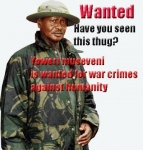
The UPDF has forcefully displaced the civilian population of the north several times in the course of the war, the most recent round beginning in 1996. Approximately 350,000 of Gulu district's 400,000 people have been forced into what the Government calls "protected camps," ranging in size from 1000 to over 50,000 individuals. Although the Government claims that people came to the camps of their own volition, those interviewed unanimously made clear that the UPDF had forced them into the camps, often by bombing and burning villages and murdering, beating, and threatening those who would not comply. Moreover, at present the UPDF does not allow people to return to their homes and regularly kills, tortures, or threatens those found outside the camps.
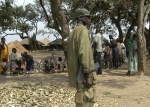
The camps confront a massive security crisis; the Ugandan military simply does not protect the interned civilians. When we visited Pabbo, a camp about 22 miles north of Gulu Town in Gulu district and containing around 50,000 civilians, only 40-50 reserve troops guarded the entire camp. The LRA can, and frequently does, attack at will. These reserve forces, the Home Guard, are poorly trained, undisciplined, and paid the equivalent of about US$17 per month. Lax recruitment procedures enable children as young as 12 and 13 to enlist, officials admitted.
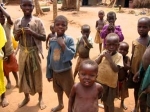
The UPDF not only fails to protect the civilians, but it terrorizes them itself. In Pabbo, every reported rape, robbery, and three quarters of the murders since 1998 were alleged to be committed by UPDF soldiers. We and other NGOs have documented extensive and systemic extrajudicial executions, beatings, rapes, and death threats against the camp population by the Ugandan army; in fact, abuses by both sides are so common that villagers flee upon encountering any soldier in the bush, whether LRA or UPDF.
UPDF soldiers commit these crimes with impunity. The Uganda Human Rights Commission (UHRC) has no presence in the camps. Victims' access to police is difficult, and those making complaints against the UPDF can be subject to harassment, torture, and execution. When a complaint is made against a soldier, the UPDF commanding officer must detain the suspect; if the officer refuses to cooperate, there is no appeal. It is common for accused soldiers to either flee to other barracks or to be transferred out of the district to avoid prosecution.
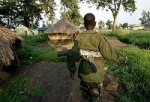
The camps make the civilians an easy target for both the LRA and the UPDF. We were informed by the UHRC that it had notified the President of the security problems in the camps, but to date nothing has been done to protect the interned civilians. Considering the Ugandan Government's extensive military resources, we conclude that the lack of security in the camps is, for some reason, intentional.

Status of Camps under the Ugandan Constitution. The 1995 Ugandan Constitution guarantees a wide range of rights, including rights to the freedom of movement throughout Uganda (Article 29), privacy of person and home (Article 27), and security of property (Article 26). Article 46 states that these rights are subject to derogation only when Parliament is taking measures "that are reasonably justifiable for dealing with a state of emergency." A state of emergency, according to Article 110, must be expressly declared by the President, and then renewed by the Parliament every ninety days. There has been no such declaration of a state of emergency by the President; therefore, these violations of basic civil and political rights are in no way constitutionally permitted derogations, and are illegal under Ugandan law. Violations of non-derogable rights, principally the right to life, and to freedom from torture and cruel, inhuman, or degrading treatment or punishment, are unlawful under any circumstances.
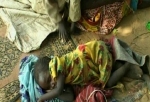
Status of Camps under International Human Rights Law. Additionally, these violations are breaches of Uganda's commitments under the international human rights treaties to which it is party, including the International Covenant on Civil and Political Rights and the Torture Convention. Many of the rights guaranteed by these instruments, notably the right to life and the right to freedom from torture, are non-derogable. Under the ICCPR, certain rights may be derogated from, but only when prescribed by law and when other States Parties are notified (Article 4), neither of which is the case.
Status of the Camps under Humanitarian Law. As the forced displacement and continued internment of the civilian population takes place within the context of an armed conflict, the Geneva Conventions apply.
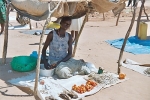
Common Article 3 to the Fourth Geneva Convention and Protocol Additional II to the Geneva Conventions Relating to the Protection of Victims of Non-International Armed Conflicts are, in IED/HLP's judgment, applicable to Uganda as the conflict there meets minimum requirements for a civil war. Grave breaches thereof constitute war crimes.
12. Article 13 of Protocol Additional II states, inter alia:
...The civilian population as such, as well as individual civilians, shall not be the object of attack. Acts or threats of violence the primary purpose of which is to spread terror among the civilian population are prohibited.
The UPDF's campaign of forced displacement in 1996 and the civlians' continued internment contravene this article, as the civilian population has been both object of attack and subject to acts and threats of violence intended to spread terror.
13. Article 17 of Protocol Additional II reads, inter alia:
...The displacement of the civilian population shall not be ordered for reasons related to the conflict unless the security of the civilians involved or imperative military reasons so demand. Should such displacements have to be carried out, all possible measures shall be taken in order that the civilian population may be received under satisfactory conditions of shelter, hygiene, health, safety and nutrition.
Even if imperative military reasons justified the creation of the camps, the Government's unwillingness to resolve the security and health crises is a violation of Article 17.
14. Finally, the Government is in violation of civilians' fundamental guarantees, articulated in paragraph 1 of Common Article 3 and Article 4 of Protocol Additional II. The latter states, inter alia:
...the following acts against the persons referred to in paragraph I are and shall remain prohibited at any time and in any place whatsoever: (a) Violence to the life, health and physical or mental well-being of persons, in particular murder as well as cruel treatment such as torture, mutilation or any form of corporal punishment; ... (d) Acts of terrorism; (e) Outrages upon personal dignity, in particular humiliating and degrading treatment, rape, enforced prostitution and any form of indecent assault;... (h) Threats to commit any of the foregoing acts. The actions of the UPDF against the civilian population of Gulu are in contravention of these guarantees.
15. Many of these violations constitute grave breaches as defined under Article 147 of Geneva Convention IV. Thereby, under Article 146 of the same Convention, the High Contracting Parties are "under the obligation to search for persons alleged to have committed, or to have ordered to be committed, such grave breaches, and shall bring such persons, regardless of their nationality, before its own courts."
16. IED/HLP calls upon the international community to execute its legal duties under humanitarian law and demand the cessation of war crimes committed by the Ugandan armed forces as well as by the LRA. We also call upon the international community to end all military assistance to Uganda while these violations continue. Finally, we demand that those responsible for these crimes be brought to justice as dictated by international law.
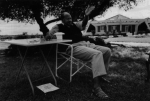
Uganda's number 1 war criminal "Yoweri Museveni" -
Weapons from uganda are causing a genocide in Congo DRC
DRC: UN seizes weapons in Ituri
18 Mar 2005 15:56:09 GMT
Source: IRIN
KINSHASA, 18 March (IRIN) - Peacekeepers in the Democratic Republic of Congo (DRC) seized guns and ammunitions on Wednesday in the embattled northeastern district of Ituri, the UN Mission there, known as MONUC, said.
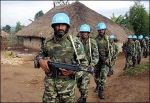
UN troops discovered the guns during an ongoing operation "cordon and search" in the territory of Zumbe, near Bunia - the district capital - MONUC said on Thursday.
Elements of the rebel Front nationale de integrationiste (FNI) were suspected of being based in the territory.
The UN operations are aimed at "neutralising militiamen, reducing their capacity for nuisance, forcing them into flight or retreat and cutting off their sources of illegal revenues," MONUC said.
Approximately 500 MONUC troops took part in the operation. They included Bangladeshi, Pakistani, South African, Moroccan and Nepalese contingents.
Recently, MONUC carried out operations in Loga, northeast of Bunia, during which they killed 60 FNI militiamen.
Guns and ammunitions are entering through Ituri to the eastern province of South Kivu from across the border with Uganda, Gen Patrick Cammaert, the acting commander of MONUC forces, said at a news conference on Wednesday in the capital, Kinshasa
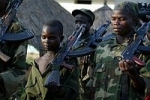
"We can see the flow of arms coming from Uganda, crossing Lake Albert, but we don't know yet who is behind it," Cammaert said. "We want to assure you that you will, when the time comes, see how we are going to conduct the operations on the lake."
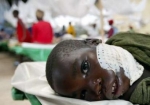

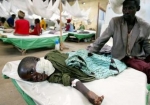
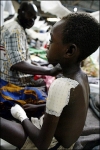
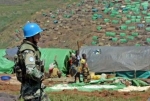
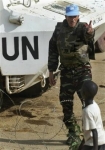
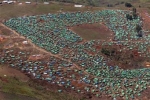
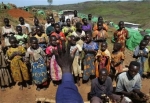


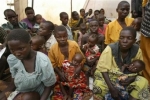
-
Congo crisis worse than Darfur
People's Media:
Uganda regime continues to bakroll and train murderrers and rapists "militias" in congo
Eastern Congo is suffering the world's worst current humanitarian crisis, with a death toll outstripping that in Sudan's strife-torn Darfur region, a top United Nations official said on Wednesday.
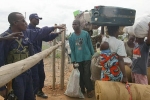
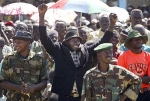
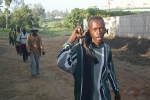
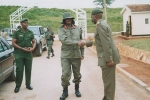
An elite within the ugandan government continue to pull strings behind the scenes. Logistics and a kangaroo tax systems continue to be managed by the notorius Presidential Protection Brigade. Money from the kangaroo taxation system has benefited NRM-O campaign programs.
UN emergency relief coordinator Jan Egeland said that over the last six years the toll in the Democratic Republic of Congo amounted to "one tsunami every six months" -- a reference to the December disaster which left about 300,000 people dead or missing in Asia.
"In terms of the human lives lost ... this is the greatest humanitarian crisis in the world today and it is beyond belief that the world is not paying more attention," he told a news conference.
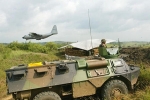
Egeland was speaking during a visit to Geneva for talks with UN and other relief workers on improving the global humanitarian aid system can be improved.
On Tuesday he came under fire from the Sudanese government over estimates transmitted through his spokesman that up to 180,000 people may have died from hunger and disease in Darfur, western Sudan, over the past 19 months of fighting.
At his Geneva news conference, he insisted the figure was a reasonable assumption -- given that an average of 10,000 civilians had been dying each month since the start of the conflict between local rebel groups and government forces backed by militias.
But the rate was declining now that the Sudanese authorities had allowed foreign aid teams into the country to help about 1.8 million people driven from their homes and largely living in refugee camps, Egeland said.

He spoke before a UN envoy in Khartoum said all international staff in part of Western Sudan were being pulled back to the local state capital because of threats from the pro-government Janjaweed militia.
Asked if too much emphasis was being put on Darfur by the international community, and especially big Western powers, Egeland said: "The amount of focus on Darfur is correct, but there is too little on (eastern) Congo."
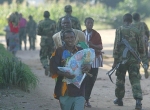
Egeland, fresh from a tour of the region, said he had impressed on the Sudanese government and rebels that they had to negotiate seriously for peace.
He had also expressed indignation to the government in Khartoum that some women raped by Janjaweed fighters and now pregnant were being persecuted for violating Islamic sharia law against sexual relations outside marriage.
"That is the ultimate insult for women who have been raped," he declared.
Egeland said the problems in eastern Congo arose because of the complexity and variety of the fighting groups there, which included regular soldiers, militias and criminal groups.
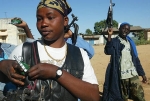
Among the fighters in eastern Congo are ethnic Hutus who fled Rwanda after the 1994 genocide there -- many of them accused of involvement in the violence in which an estimated 800,000 Tutsis and moderate Hutus were killed.
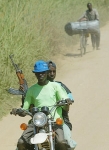
The United Nations has mounted a major relief operation in the region, where Egeland said some 3 million civilians buffeted by the conflict are in need of help to survive, and this week gave militia fighters two weeks to disarm.
—Reuters
-
Congo war is world's top 'forgotten' crisis
By Ruth Gidley
London - Brutal conflicts in Congo, Uganda and Sudan are the world's three biggest "forgotten emergencies", each dwarfing the toll of the Asian tsunami but attracting scant media interest, a Reuters poll of experts showed on Thursday.

War in Democratic Republic of Congo has claimed at least 10 times as many lives as the December tsunami yet remains almost unheard of outside of Africa, key players in the aid world said.
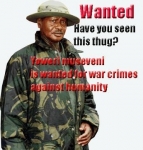
"It's the worst humanitarian tragedy since the Holocaust," said John O'Shea, chief executive of Irish relief agency GOAL. "The greatest example on the planet of man's inhumanity to man."
'The greatest example on the planet of man's inhumanity to man'
Reuters AlertNet, a humanitarian news website run by Reuters Foundation, asked more than 100 humanitarian professionals, media personalities, academics and activists which "forgotten" crises the media should focus on in 2005.
After Congo, they chose northern Uganda, west and south Sudan, West Africa, Colombia, Chechnya, Nepal and Haiti as the most neglected humanitarian hotspots.

They also highlighted the global AIDS pandemic and other infectious diseases such as malaria and tuberculosis as "silent tsunamis" that kill millions every year.
"Africa experiences the devastating effect of two tsunamis every month," said Amy Slorach, appeal coordinator for British relief organisation Tearfund.
Many experts accused the Western media of routinely ignoring emergencies in countries of little geopolitical significance for big powers despite the enormous scale of suffering.
"One television news producer we met in the US summed up the situation since spring 2003 this way: 'Look, we've got three foreign news priorities these days: Iraq, Iraq, Iraq,'" said Gareth Evans, head of the International Crisis Group think tank.
"And Iraq is not simply an American obsession. We've heard a similar refrain from news producers and newspaper editors again and again throughout Europe and elsewhere."
Almost half of those polled - including UN relief coordinator Jan Egeland and US leftwing intellectual Noam Chomsky - nominated Congo, citing the brutality of an ugly, tangled war that has killed nearly four million people since 1998.
Congo's war officially ended in 2003 but fighting still rages in parts of the east and the United Nations estimates that 3 million people are cut off from desperately needed aid.
"The human suffering is mind-boggling," said Lindsey Hilsum, international editor for Britain's Channel 4 News. "The wickedness and cruelty of the armed men who kill and maim and rape defies belief."
The details of northern Uganda's 18-year war, ranked second in the AlertNet poll, are just as shocking.
More than 20 000 children have been abducted by a cult-like rebel group and forced to serve as soldiers and sex slaves, while most of the population in the conflict zone have been forced from their homes into squalid camps, say aid agencies.
"Like many people, I didn't have any idea of the scale of this conflict," said British Hollywod star Helen Mirren, who traveled to Uganda with relief agency Oxfam.
"Nearly two million people have been made homeless and hundreds of thousands more have been killed."
The experts' third most neglected emergency was Sudan, where Africa's longest-running civil war has raged for two decades in the south and almost two years of atrocities in the western Darfur region have raised the spectre of genocide.
"Darfur has slipped from the front pages, but the situation there is again going from terrible to being absolutely horrendous," UN relief coordinator Jan Egeland said.
The poll also highlighted misery in West Africa after bloodletting in Liberia, Ivory Coast and Sierra Leone, along with suffering in conflict-riven Chechnya, Nepal and Haiti.
Experts urged the media not to ignore the impact of the HIV and Aids pandemic sweeping sub-Saharan Africa and threatening to explode in India and China, the world's most populous countries.
They also drew attention to lesser-known Aids threats in Eastern Europe, the Caribbean and Papua New Guinea, along with other infectious diseases. Malaria kills an African child every 30 seconds, while tuberculosis kills about 2 million a year worldwide.



